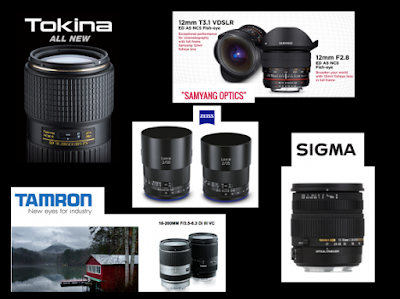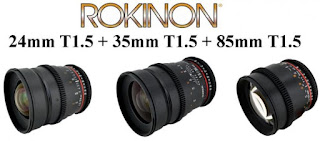The
photographers were not affected by the prices or models from Canon or Nikon DSLR
camera, will argue that they are more concerned to invest their money on the
lens, instead of prioritizing the camera body. Once they are confident with the
choice of a DSLR camera, photography enthusiast then began to hunt an
additional lens, instead of just relying on the default kit lens. They are
trying to buy original Canon or Nikon lenses. They may not think to buy a
third-party lens camera manufactured by Tamron, Sigma, Rokinon, Tokina or other brands.
There
is also a growing myth that if you use the original lens, then you will get brilliant
and sharp picture, even guaranteed to be accurate. Also believed that the
original lens is much more expensive than lenses manufactured by third party
companies such as Rokinon, Sigma, Samyang, Sigma, Tokina or Carl Zeiss lenses, and
more.
It turns out this myth is not always true, either on the accuracy and
sharpness or brilliance of photographs that can be produced by a third-party
lenses. If the disputed from the aspect of price, it turns out the original
Canon or Nikon lenses could be cheaper than lenses made by Sigma or Tamron.
Tamron or Sigma has a long experience to make a good lens for Canon and
Nikon DSLR. There are a lot of their production lenses that have better
features than the original lens Nikon or Canon, for example, an image
stabilizer technology, which is not found on certain types of lenses in Canon
and Nikon lenses. Perhaps this is what makes third-party lens becomes more
expensive for the same type than the original lens Canon or Nikon. However, you
will enjoy the image stabilization, so that you believe yourself to shoot at
certain conditions.
 |
| Third party lenses. Image: billfortney.com |
When you choose a superzoom lens or telephoto lens, it turns out you can
get a longer zoom range on a third-party lens, even more affordable price.
You
can get this information from the online shops specialized in selling lenses
and cameras. So that you are more confident, you need to look at the official
website of Sigma, Tamron or Tokina, so you get more accurate information. Who
knew you could find another lens with attractive offers such as a macro lens,
wide angle lens or fixed lens.
Therefore, you need to see the catalog or information on the Internet,
before you decide to buy a new lens for your DSLR camera. If you insist on
buying original lens for Canon or Nikon camera, then you can buy a used lens.
You can get a used lens in stores trusted in your town, if you have not got the
guts to buy online. There is a community of photographers who are willing to
share information about the lens used, you can even buy a lens that you dream
to one of the members of that community.
 |
Tokina, Tamron or Sigma? Image: keepsnap.com |
Another way to get the original lens is to trade with your own lens. You
can also buy original lens Nikon or Canon to pay in installments, of course
with a credit card or other finance companies. If you have a steady income as
an employee or have income from your online business, then you can realize your
dream to get a telephoto lens or fixed lens. Make sure that you are wise you
will not bother to pay off your credit card.
Rokinon
lens. Image: nofilmschool.com
|
|
My simple advice is, make sure beforehand about the type and model of the
lens you need, not because it is affected by your friends or stuck on the
original lens Canon or Nikon. Consider also the opinions or reviews of the
camera lens in a leading photography magazine photographers or forum on the
Internet. Hopefully this article can help you to get the best lenses for your
photography activities. Because sharing is beautiful, please share this
information with friends or family who have the same hobby with you, so that
everyone can become a great photographer like you.











1 komentar:
Write komentarUnfortunately, it has been the experience of both myself, and the majority of the pro photographers I speak with, that third party lenses do not focus as consistently accurately on Canon and Nikon DSLR's, as do native lenses. This is due to the fact that the all-important chip in AF lenses must be reverse engineered by each third party manufacturer. Having said that, mirrorless cameras - and live-mode - overcome this one issue by allowing each lens to project its image directly onto the sensor. Recently, third party lenses have been exposing (pun intended) Canon and Nikon for their lack of optical innovation and pricing policies.
Reply